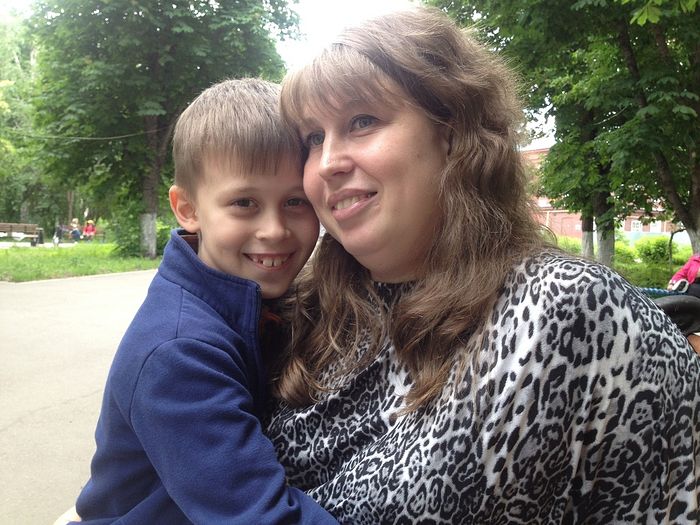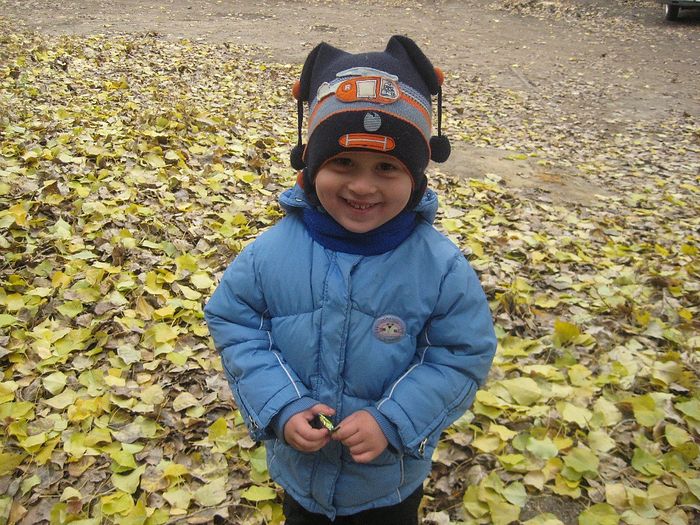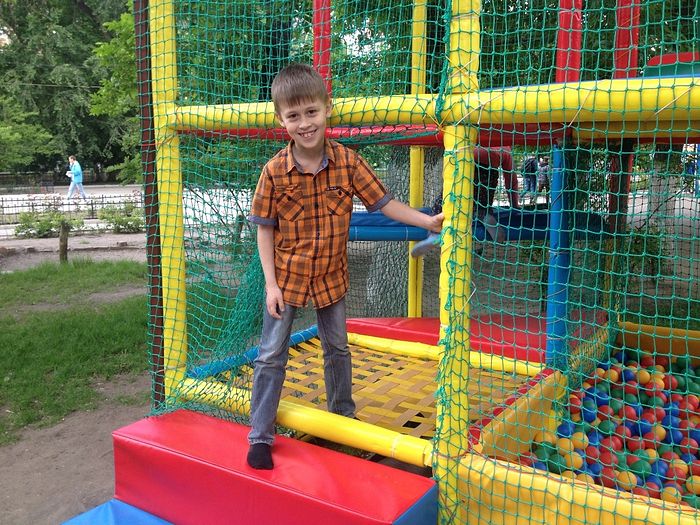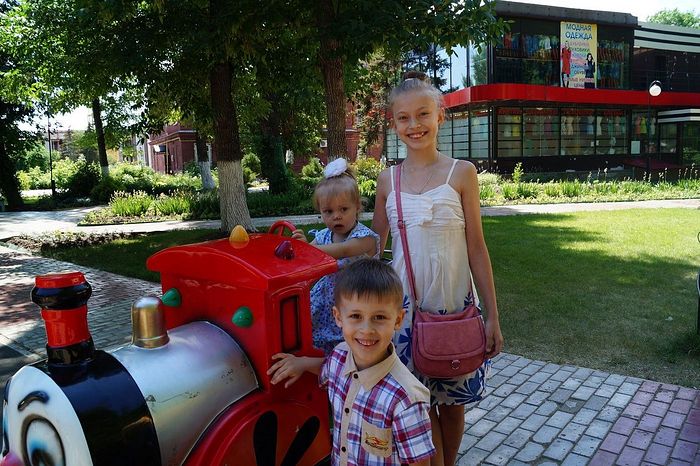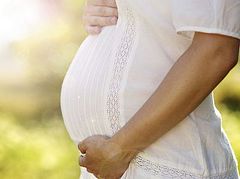Even if we believe in God we often doubt that our faith can triumph over the laws of nature. But some people trust God so much that the Lord Himself enters their lives and acts in them, helping them overcome the most difficult circumstances and trample down the seemingly inviolable laws of nature. And this is precisely what happened in the life of little Bogdan Yunusov. Eight years ago, when this boy still was in his mother’s womb, a council of physicians was convened in order to convince him not to be born. But Bogdan nevertheless was born because his mom loved him dearly even before his birth. And the Creator, seeing the woman’s strong love, trust and courage, helped Bogdanchik [a diminutive form of the name “Bogdan”] to be born with a wide, sunny smile and good health.
The world of the deaf?
I met Bogdan through his mother. Elena Yunusova from the city of Saratov, thirty-four, told me how because of a medical error she had nearly lost her still unborn baby. Doctors confused her pregnancy with some female disease and began to “treat” her. And later for a long time they tried to convince her not to give birth to Bogdan because the use of the drugs they were giving her were contra-indicated in pregnancy.
The doctors warned Bogdan’s parents that their son would be born deaf: if a mother takes such drugs during pregnancy her child has a eighty per cent chance of having congenital deafness.
In this article we will not disclose the names of the physicians responsible for the situation Elena got in. The article is not about doctors or medical errors. Neither is it about the state of our health care in the age of scientific achievements…
But let “tilting at windmills” not overshadow this story, based on love. All the more so because there are lots of obstacles and trials like these in the life of every single person, and it is impossible to surmount all of them as long as, according to the Holy Scriptures, the whole world lies in the power of the evil one (1 Jn. 5:19).
And, beyond all doubt, what happened to Elena could have happened to anybody else and wherever else as well. This story tells how love conquers fear nourished by enormous psychological pressure.
“I love him, regardless of his possible birth defects!”
When Elena was told that her son would be born deaf she just accepted it and began to learn sign language so that her beloved son Bogdanchik could communicate with her and the numerous his father’s relatives. She did not see any reason for killing her baby when she heard that potential diagnosis. And neither did Elena’s husband, Ali Yunusov, – a Tatar by birth and a Muslim.
“Children can live with this disability. Many have various defects: some have long noses, others have a little bowed legs, and others have hearing loss… What does it matter?!” exclaimed Ali, wondering how possible deafness could be an indication for the termination of pregnancy. Like his wife Elena, he is a very religious person and he could not understand how any indications for abortion may exist.
“We will pray for him to God!” Bogdan’s grandmother, Elena’s mother, said.
But the Lord wanted to test their faith one more time.
When Elena suddenly started bleeding during her pregnancy, after ultrasonic examination doctors informed her that the placenta had been detached prematurely; most likely the baby had already died in her uterus and, therefore, an abortion was unavoidable.
“But something unconceivable occurred: My attending physician who (among other doctors) had earlier tried to talk me into having an abortion, said that she would not do it until I had another ultrasound scan at a perinatal center,” Elena recounts. “She herself phoned a doctor from that center (whom she personally knew) and arranged for me to have an appointment, then she called a taxi and sent me to the center. That change was a shock to me, but, to be honest, as soon as I discovered I was pregnant I prayed for my baby all the time.
“At last the physician saw me. I was lying with bated breath, waiting for her verdict. Having examined me, the doctor asked me why my eyes were red with tears when I had such a wonder in my belly! She used a Doppler fetal monitor and I heard my baby’s heart beat. It was a wonderful melody!...
“I lingered in the corridor for another couple of hours, calling my mother, my husband, and simply rejoicing that the Lord answered my prayers. I was ready to cry with joy. Coming back to the hospital, I thanked my doctor for referring me to that specialist. She replied: ‘You, mama, have struggled for your baby so strenuously that you’ve infected us with the desire to save its life.’ She was aware that the ultrasound scanner worked poorly, and so seeing my torments, she had scruples about performing an operation on me without having extra checkup.
“As for bleeding, it turned out to be the aftermath of my nervous shock caused by my stay at hospital. After a couple of days I was discharged from the hospital. The doctors assured me that the baby had an eighty percent chance of having deafness. My husband reassured me, saying: ‘Let’s not dramatize the situation! After all, we don’t know if our baby is going to be born deaf or not.’ I prayed and hoped that our child would be among the other twenty percent despite everything…
“When I calmed down, I went to church. After a long conversation with Fr. Sergy Vygodin from the Church of the Descent of the Holy Spirit on the Apostles I wholeheartedly reconciled myself to my lot – to whatever the Lord was going to send me. I firmly decided: I will love my child regardless of his condition; he holds a special place in my heart already now. The priest told me which prayers I ought to read for a healthy pregnancy and safe delivery. I did all that he recommended me to do! I prayed for my baby to God, I thanked the Almighty for guiding me through that difficult path, for helping me preserve faith in Him and set all hopes on Him alone.”
“Don’t worry, mama! Your baby is healthy!”
But let Elena resume her story. Her first-person narration sounds very special:
“The month of my baby’s birth came. My husband and I counted the days before our first meeting with our little one. At last my child was born! And it was a boy! Of course, nobody told me in the very beginning if he was deaf or not. They only said that a special examination had to be done a little later. Our joy and happiness were so great that we did not even think about our son’s possible deafness. He was our beloved and desired child, and, most importantly, he was alive. I thanked God for the safe delivery, for the gift of this child, thanked Him for being with me and not abandoning me.
“Of course, I begged absolutely all the doctors at the maternity home to perform medical examination of my little son! I decided to test his hearing ability myself and clasped my hands loudly in the ward, but he did not respond. I was almost certain that he was deaf. At length hearing specialists came and conducted a hearing test. A physician loudly clasped his hands as well, but there was no reaction. So they took my son to conduct additional tests. An hour later they brought him back and said that the baby was tired of my anxiety and emotions and after the delivery he decided to have a good sleep. ‘Don’t worry, mama! Your baby is healthy!’ the doctors said. We gave him the name ‘Bogdan’ [which means “given by God” in Russian.—Ed.] – our God-given baby.”
I meet with Elena and little Bogdan in a playground near a covered market. I am looking at this kind, merry lad who is smiling broadly and fondly embracing his mom, and cannot believe that it might not have been the way it is. He might not have been born!
Pro-life activists who persuade women not to resort to abortions very often give themselves up to cold propaganda which lacks life and love. Recently Elena launched a sort of “missionary” campaign as well: She has been doing it in social networks or just during conversations with her acquaintances. Every time she meets a pregnant woman who is going to get an abortion, Elena tries to convince this future mom not to kill her baby. And she is not interested in abstract theorizing. Her main “argument” in defense of life is always with her – running, smiling and getting only good grades at school.
After Bogdan, Elena gave birth to two more babies and now the Yunusov family has already four children: two boys and two girls. Elena wants even more children, but her husband asks her to wait a little: he is an ordinary worker at an automobile sales center and he barely earns enough to provide for his family. Although Ali works with cars, he still does not have his own car.
Ali adores children. According to Elena, he loves all kids. “The children of that man, and of that neighbor and so on. They are drawn to him and reciprocate his affection, and are not even afraid of his bristles!” The Ali’s and Elena’s apartment is always filled with children who gather there from the whole industrial area to play.
Help from above, or “magic” sandals?
Elena also relates how God often helps them in a visible way. “Before I have time to think about anything, it immediately comes true,” says Elena with a smile. And she tells the story how once Bogdanchik accidentally tore his sandals and got very frustrated because he had no other shoes to go for a walk in. He had almost gotten seriously upset when the doorbell rang. It was our neighbor, holding a pair of children’s sandals in her hands. She said to Elena that her child had grown out of these sandals and asked her if she wanted them. “What is their size?” Elena asked. “Size 30 [size 13 in the USA],” the neighbor replied. “It is just our size! Bogdan, put on the sandals and let us go for a walk!” Elena exclaimed.
Elena has a great many similar stories. In fact they occur continually, but one has to have the ability to notice them and not to think that they are coincidences. “We need to thank God for them. Only then will it be easier for God to participate in our lives,” Elena makes an observation.
As I am looking at Elena I realize that it is no wonder that she has been experiencing these miracles. Simple, unpretentious and persistent at the same time, Elena has a sunny disposition and integrity. She is humble when she ought to be humble, and she struggles when she ought to struggle; and she does it very naturally.
So the six of them live in a two-room apartment and are currently trying to get a place in the queue for housing improvement (intended for families with many children). Elena is trying to convince the bureaucrats that their arguments are respectable and is doing it gently yet persistently. Her family is the 1044th in the queue for the compensation. “It means that my grandchildren will probably obtain the compensation, provided I am still alive,” Elena explains their prospects of being granted state aid in the future.
Now Elena is trying to get a place in a housing queue for getting a new apartment. She says that a waiting list for housing is considerably shorter there, so they have a chance to become “happy new tenants” not in thirty or fifty years, but earlier…
It took Elena ages to convince the bureaucrats that she had a legal right to start a kindergarten at home – the law allows this, provided that there are at least three children of preschool age in the flat. Now she is paid 3,500 rubles for this…
Now Ali and Elena have been offered a plot of land on the outskirts of Saratov, but to date they don’t have enough money to build a house.
However, Elena does not complain about anything, she loves her city of Saratov and calls it “my beloved native city.” Her positive and philosophical attitude toward life is worth learning from.
Love and the crescent
Curiously enough, although Elena and Ali are from different religious traditions, it does not at all prevent them from loving and respecting each other. They met at a café, when Ali was nineteen and Elena was eighteen; a year later they got married in defiance of the opposition of Ali’s numerous Tatar relatives who wanted him to have a Tatar wife, not a Russian wife. But Ali was adamant—he was in love with Elena. And Elena wanted to become his wife so much that she agreed to have a traditional Muslim wedding celebration and… even embraced Islam for two days. But she soon changed her mind and returned to Orthodoxy.
“I ran to the church, to Fr. Sergy, and cried out: ‘Father! What have I done?! I have made a bid mistake! Please, receive me back into Orthodoxy!’ Fr. Sergy heard my confession, read the prayers of absolution over me and readmitted me to the Church. Of course, my husband is confident that his faith is true, while I am certain that my faith is true. He still makes attempts to convert me, but he does it gently, not with fanaticism. He is a rather secular person, so this difference does not affect our relations in marriage,” Elena, to our surprise, shares the advantages of her mixed “interconfessional” marriage with us.
In the letter that Elena, a mother of four, has sent us, she explains the motives of writing it:
“This is a story for those who doubt and hesitate whether to give birth or not to give birth to a baby. There is only one answer: Become a mother. Could you kill your baby after he’s been born? Why not? Is it heartbreaking? Then what is the difference between an unborn baby and a newborn baby? How is it that you don’t have pity on the helpless baby who is utterly dependent on you? Is it because you can’t see him and can’t smell his fragrance? Wait for a few months and you will meet him for the first time!
There are many organizations supporting pregnant women in crisis. There are doctors who see your unwillingness to become a killer and help you. There are churches where people will tell you what awaits your baby and you after abortion. I continue to call upon women not to have abortions. There is a good phrase: ‘Abortion doesn’t make you unpregnant, it makes you a mother of a dead baby’. Thus, isn’t it better to choose life for yourself and your little one?!”


